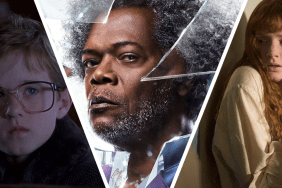
Last night I got in a discussion concerning the Best Supporting Actor race at the Oscars and it was agreed that of the five nominees Alan Arkin (Argo) is the least likely to win. Then you have Robert De Niro (Silver Linings Playbook), Philip Seymour Hoffman (The Master), Tommy Lee Jones (Lincoln) and finally Christoph Waltz (Django Unchained). I think, and those I was talking to agreed, a case could be made for all of the final four. However, when it came to making a case for Waltz I said, “Problem there is he doesn’t even give the best performance in the movie.” What I want to ask you, if you agree, is who does?

In my opinion the best performance comes from Samuel L. Jackson as Calvin Candie’s house slave Stephen. That term “house slave” is part of the reason. Jackson creates a character that certainly doesn’t seem to consider himself a slave and the thought he put into the performance shows on screen. Jackson’s confidence as an actor exudes from a character that may cause the most conflicted feelings from an audience. From his denigration of Django upon his arrival to Candie’s plantation to the wretched scream he gives out when he sees his master shot in the chest.
In an interview with Australia’s The Chronicle Jackson says of Stephen, “Does he look like he thinks he’s a slave? You can see him physically. Does he treat himself like a slave? Is he obsequious? OK, well there you have it. He’s living a pretty good life. And, no, I don’t think he’s a bad guy.”
Jackson continued, “[T]here are certain people who are comfortable in the institution of slavery and there are certain people who are not. Stephen is comfortable in it. He’s a collaborator. If it’s black against white, Stephen’s a collaborator.”
It’s curious to see Jackson say “I don’t think he’s a bad guy” when in previous interviews he’s referred to his reading of the script and his thoughts on the character as “the most hated negro in cinematic history“. Therein lies what makes him so interesting, a man that can be looked at as the most hated black character in cinematic history and yet Jackson says he doesn’t consider him a “bad guy”.
Stephen is a character that speaks to many of the issues Django Unchained touches upon, but never fully delves into. After all, it’s not a movie about slavery as Jackson told The Chronicle. “Slavery just happens to be a backdrop. Even Django is not trying to end slavery. He’s just trying to get his girl back.” I wonder, though, had Django been about slavery, would the Academy look at Jackson’s character more seriously?

If I were to rank them, I’d probably consider DiCaprio’s performance as Calvin Candie the second best in the film, if only because I also consider it to be the least affected. Tarantino gives Calvin plenty to say, but it isn’t the same kind of villain we typically get from Tarantino. So often Tarantino’s villains are characters you love to hate, with this film he offers up villains you simply hate, Candie chief among them.
Candie doesn’t get as many of the quick witted one-liners so many of Tarantino’s villains in the past have received. Instead he offers up a lengthy, hate-filled soliloquy on the black man’s skull and it doesn’t end with “That’s a bingo.” Instead it ends with a hammer and a blood-smeared face. It’s sickening and intentionally so.
Waltz’s Dr. King Schultz is a close third, playing, more-or-less, a variant of his Hans Landa character from Inglourious Basterds only this time he’s the hero. He’s a likable guy and Tarantino clearly likes him as much as it’s obvious Tarantino hates Candie, but Waltz’s performance, while great, just didn’t do as much for me as Jackson or DiCaprio.
As for Jamie Foxx as the titular Django, he is certainly not the most flamboyant character in the film as much as he’s a heat-seeking missile on a mission to get his wife (Kerry Washington) back. Many dismiss this film as just another revenge film when in fact it’s a straight-forward romance that only ends in a bloodbath as a result of cause and effect. Had it been a revenge film Django’s path would have taken him to Old Man Carrucan (Bruce Dern) rather than looking for Broomhilda immediately. Instead of tagging along with Schultz through the winter he would have suggested side tracking to give Carrucan the payback he deserved.
There’s a lot to dissect beneath the surface when it comes to Django, just as much for the decisions he made as for those he doesn’t. To dismiss him as uninteresting is to say just because he took a right instead of a left he didn’t consider the consequences of going the other direction. Perhaps if Foxx had given a better performance we would be discussing this more. Perhaps the character is lacking… I don’t really know for sure.
I realize I walk a fine line between liking the character over the performance, but I’m of a mind that one leads to the other. Perhaps you agree, maybe you don’t, but I did want to clarify.
Waltz is the only one with a chance at winning the Oscar and he just won the Golden Globe. None of the Django cast was nominated for a Screen Actors Guild Award, so come the 27th we won’t be having this discussion again. But you tell me, of the four leading men in Django Unchained, which one do you believe gave the best performance and why?
Vote in the poll below and leave your thoughts in the comments.









